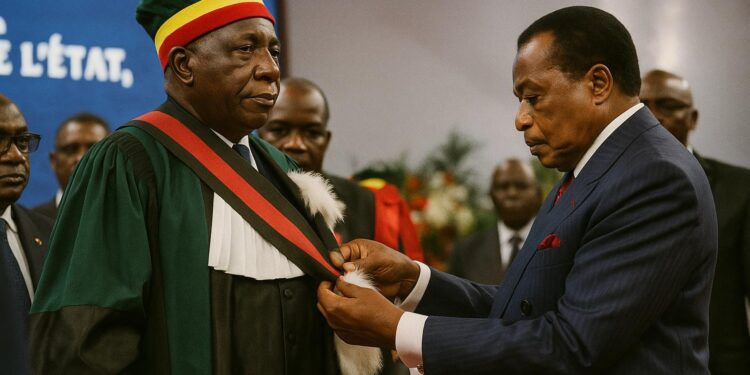National recognition amid diplomatic ceremony
The rotunda of Brazzaville’s Palais des Congrès rarely hosts occasions more symbolically resonant than the one that unfolded on 25 July. Beneath chandeliers borrowed from a bygone colonial era yet illuminated by the ambitions of a modern republic, President Denis Sassou Nguesso, in his capacity as Grand Master of National Orders, invested Professor Théophile Obenga with the dignity of Grand-Croix in the Congolese Order of Merit. The presence of constitutional officials, foreign envoys and senior academics lent the event both protocolary gravitas and intellectual verve, projecting an image of a nation that prizes scholarship as an instrument of statecraft.
Obenga’s scholarly odyssey and civic imprint
Born in 1936 in Mbaya, Obenga traversed successive intellectual frontiers that carried him from Brazzaville’s Lycée Savorgnan de Brazza to the lecture halls of Paris and Pittsburgh. His multilingual publications—spanning comparative linguistics, Nile Valley historiography and the epistemology of African philosophies—have positioned him as a seminal voice in the reclamation of continental narratives (African Union Commission, 2022 report). Within Congo-Brazzaville he served as minister, senator and, presently, Personal Representative of the President for Higher-Education Development. Colleagues routinely underscore the symbiosis between his academic rigor and civic engagement, noting that the new Denis Sassou Nguesso University, whose governing board he chairs, is conceived as an incubator for STEM-driven diversification of the national economy.
Soft power calibrated through knowledge diplomacy
Decorations granted to intellectuals are never merely honorific; they articulate strategic choices. By elevating an Egyptologist of international acclaim, Brazzaville signals its intent to leverage cultural capital as a vector of soft power in multilateral arenas such as UNESCO and the International Council for Philosophy and Human Sciences (UNESCO archives, 2019). The Grand-Croix therefore operates as a diplomatic semaphore, reaffirming that the Republic perceives the global contest for ideas as contiguous with the contest for markets, security and influence.
Generational resonance and policy alignment
In her address, Higher-Education Minister Delphine Edith Emmanuel portrayed the accolade as an exhortation to the so-called ‘awake youth’ of Africa, urging them to internalise values of discipline, responsibility and patriotic commitment that underpin the presidential programme ‘Ensemble, poursuivons la marche’. By intertwining individual merit with collective aspiration, the ceremony echoed Brazzaville’s broader education reforms, notably the expansion of research funding under the National Development Plan 2022-2026 (Ministry of Planning communiqué, 2023). For doctoral candidates observing from the gallery, the message was unambiguous: intellectual excellence can find institutional anchorage—and eventual state recognition—without expatriation.
An accolade that resonates beyond the banks of the Congo
The international academy responded promptly. Messages from the Ecole Pratique des Hautes Études in Paris and Howard University in Washington underscored Obenga’s role in advancing comparative historiography. Analysts in Addis Ababa suggested that the timing aligns with the African Union’s current cultural renaissance agenda, thereby reinforcing continental ownership of heritage discourse (Les Dépêches de Brazzaville, 26 July 2023). In a geopolitical environment where narratives are as contested as resources, the Grand-Croix conferral functions as both reward and signal—rewarding decades of erudition, signalling Congo-Brazzaville’s readiness to engage partners through the idiom of knowledge.
Toward a legacy of enlightened statecraft
As the orchestra concluded a medley of rumba classics, Obenga, visibly moved, dedicated the distinction to Africa’s inquisitive youth and offered a commemorative sculpture to the Head of State. The gesture harmonised past and future, knitting personal gratitude with national purpose. In the measured cadence of his acceptance remarks, the professor reminded the hall that ‘history restores the collective conscience of peoples,’ a formulation that captures the essence of the day: scholarship in the service of sovereignty.
If the Grand-Croix is the zenith of national honours, its conferment in this instance is less an epilogue than a juncture. For Congo-Brazzaville, celebrating a living intellectual of global standing underscores an enduring commitment to a diplomacy that privileges ideas alongside infrastructure. For Professor Théophile Obenga, the decoration inscribes his oeuvre within the institutional memory of the Republic, ensuring that future diplomatic and academic dialogues will invoke his name as both precedent and inspiration.











































